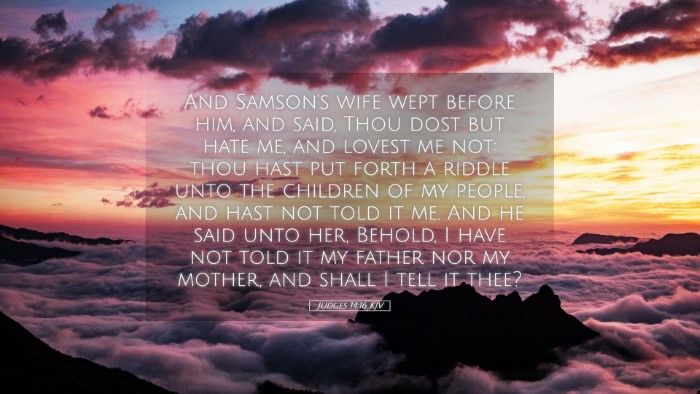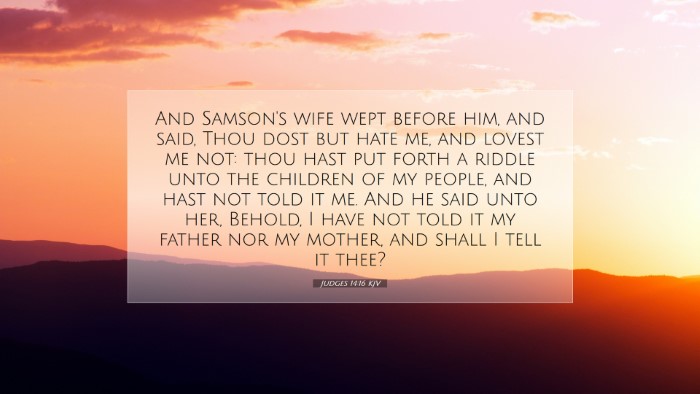Old Testament
Genesis Exodus Leviticus Numbers Deuteronomy Joshua Judges Ruth 1 Samuel 2 Samuel 1 Kings 2 Kings 1 Chronicles 2 Chronicles Ezra Nehemiah Esther Job Psalms Proverbs Ecclesiastes Song of Solomon Isaiah Jeremiah Lamentations Ezekiel Daniel Hosea Joel Amos Obadiah Jonah Micah Nahum Habakkuk Zephaniah Haggai Zechariah MalachiJudges 14:16
Judges 14:16 KJV
And Samson's wife wept before him, and said, Thou dost but hate me, and lovest me not: thou hast put forth a riddle unto the children of my people, and hast not told it me. And he said unto her, Behold, I have not told it my father nor my mother, and shall I tell it thee?
Judges 14:16 Bible Commentary
Commentary on Judges 14:16
Bible Verse: Judges 14:16 - "And Samson's wife wept before him, and said, 'Thou dost but hate me, and lovest not me: thou hast put forth a riddle unto the children of my people, and hast not told it me.' And he said unto her, 'Behold, I have not told it my father nor my mother, and shall I tell it thee?'
Contextual Background
This verse is situated within the narrative of Samson, a judge of Israel known for his extraordinary strength. His interaction with his wife provides critical insight into his personal struggles and relational dynamics, symbolizing the larger themes of conflict, betrayal, and the human condition as portrayed in the Book of Judges.
Insights from Matthew Henry
Matthew Henry presents this passage as a reflection of the emotional turmoil and complexities inherent in Samson's relationships. He notes:
- Emotional Manipulation: The wife's tears illustrate her emotional manipulation. In her plea, she equates his riddle to hatred, which reflects a misunderstanding of Samson's character and intentions.
- Secrecy and Trust: Henry emphasizes the theme of secrecy in relationships. Samson's refusal to disclose the riddle signifies a deeper lack of trust and connection, which is paramount in any relational dynamic.
- Symbol of Betrayal: The conflict encapsulated in the verse signifies betrayal not just in marital terms but also within the context of national loyalty, as Samson marries a Philistine, illustrating the spiritual and cultural deterioration of Israel.
Insights from Albert Barnes
Albert Barnes examines the interpersonal communication in the passage. He points out:
- Riddles as a Test of Intellect: The riddle symbolizes both a challenge and a test of intellect within the narrative. By not sharing it, Samson establishes a boundary that speaks to deeper relational issues.
- Human Emotions: Barnes suggests that the emotional reliance demonstrated by the wife showcases a common human experience of insecurity and the desperate quest for affirmation in the face of perceived rejection.
- Foreshadowing Conflict: The verse serves as a foreshadowing of the inevitable conflict that will arise not only between Samson and the Philistines but also within his personal relationships.
Insights from Adam Clarke
Adam Clarke provides critical analysis on the implications of Samson’s response:
- Indication of Character: Clarke interprets Samson’s words as revealing his character. His unwillingness to share the riddle with his wife reflects a lack of commitment and emotional connection.
- Gender Dynamics: Clarke draws attention to the gender dynamics at play, where the wife's plea indicates her expected role in a union based on emotional equality, which is undermined by Samson's secretive nature.
- Spiritual Symbolism: Clarke also sees this scenario as symbolic of the broader spiritual betrayal of Israel, where the chosen people (represented by Samson) fail to live in accordance with their divine calling.
Theological Reflections
In light of these commentaries, this verse invites several theological reflections relevant to pastors, students, and scholars:
- Relationships and Communication: The passage emphasizes the importance of open communication in relationships. Understanding and trust are vital to avoid misunderstandings that lead to conflict.
- Cultural and Spiritual Betrayal: Samson’s marriage to a Philistine woman can be viewed as a metaphor for the church's relationship to the world today, cautioning against compromises that dilute spiritual integrity.
- Human Emotion and Divine Purpose: The emotional struggles depicted provide a glimpse into the human experience which is fraught with challenges, yet they also serve as a reminder of God’s overarching purpose that can use even flawed relationships for divine ends.
Conclusion
The passage in Judges 14:16 serves not only as a narrative about Samson and his wife but also as a profound commentary on the nature of human relationships, secrecy, and the consequences of betrayal. The insights from Matthews Henry, Albert Barnes, and Adam Clarke collectively deepen our understanding, making this scripture relevant for contemporary discourse on relationships, faith, and cultural fidelity.


